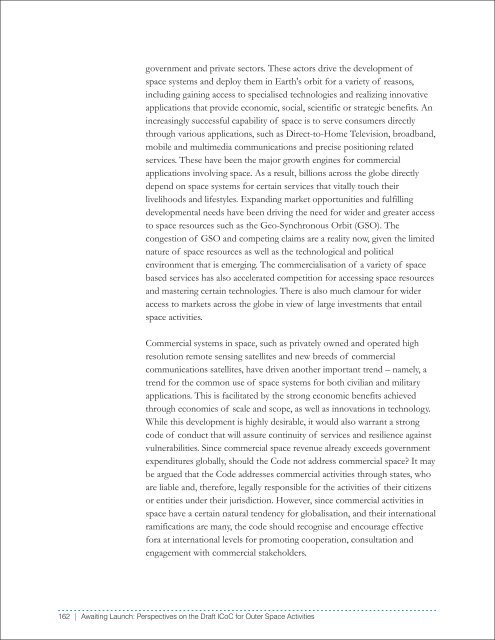AwaitingLaunch_1397728623369
AwaitingLaunch_1397728623369
AwaitingLaunch_1397728623369
Create successful ePaper yourself
Turn your PDF publications into a flip-book with our unique Google optimized e-Paper software.
government and private sectors. These actors drive the development of<br />
space systems and deploy them in Earth's orbit for a variety of reasons,<br />
including gaining access to specialised technologies and realizing innovative<br />
applications that provide economic, social, scientific or strategic benefits. An<br />
increasingly successful capability of space is to serve consumers directly<br />
through various applications, such as Direct-to-Home Television, broadband,<br />
mobile and multimedia communications and precise positioning related<br />
services. These have been the major growth engines for commercial<br />
applications involving space. As a result, billions across the globe directly<br />
depend on space systems for certain services that vitally touch their<br />
livelihoods and lifestyles. Expanding market opportunities and fulfilling<br />
developmental needs have been driving the need for wider and greater access<br />
to space resources such as the Geo-Synchronous Orbit (GSO). The<br />
congestion of GSO and competing claims are a reality now, given the limited<br />
nature of space resources as well as the technological and political<br />
environment that is emerging. The commercialisation of a variety of space<br />
based services has also accelerated competition for accessing space resources<br />
and mastering certain technologies. There is also much clamour for wider<br />
access to markets across the globe in view of large investments that entail<br />
space activities.<br />
Commercial systems in space, such as privately owned and operated high<br />
resolution remote sensing satellites and new breeds of commercial<br />
communications satellites, have driven another important trend – namely, a<br />
trend for the common use of space systems for both civilian and military<br />
applications. This is facilitated by the strong economic benefits achieved<br />
through economies of scale and scope, as well as innovations in technology.<br />
While this development is highly desirable, it would also warrant a strong<br />
code of conduct that will assure continuity of services and resilience against<br />
vulnerabilities. Since commercial space revenue already exceeds government<br />
expenditures globally, should the Code not address commercial space? It may<br />
be argued that the Code addresses commercial activities through states, who<br />
are liable and, therefore, legally responsible for the activities of their citizens<br />
or entities under their jurisdiction. However, since commercial activities in<br />
space have a certain natural tendency for globalisation, and their international<br />
ramifications are many, the code should recognise and encourage effective<br />
fora at international levels for promoting cooperation, consultation and<br />
engagement with commercial stakeholders.<br />
162 | Awaiting Launch: Perspectives on the Draft ICoC for Outer Space Activities








